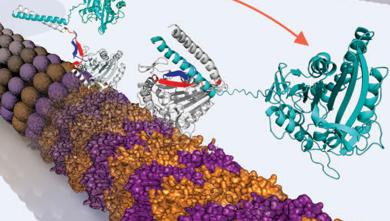Biophysics and Systems Biology @ MIT
Studying Biophysics as a Graduate Student at MIT
Biophysics Certificate Program
Graduate students currently enrolled in one of the existing graduate programs are invited to become part of the biophysics community by getting a certificate in biophysics. We also have a bi-weekly seminar series, student lunch talks, and a yearly retreat.
Systems Biology Class, taught by Jeff Gore every Fall
Introduction to cellular and population-level systems biology with an emphasis on synthetic biology, modeling of genetic networks, cell-cell interactions, and evolutionary dynamics. Cellular systems include genetic switches and oscillators, network motifs, genetic network evolution, and cellular decision-making. Population-level systems include models of pattern formation, cell-cell communication, and evolutionary systems biology. Students taking graduate version explore the subject in more depth.
Studying Biophysics as an undergraduate
MIT does not have a biophysics major, but an excellent biophysics course of study can be obtained via the flexible physics option together with a focus in biology. One possible course schedule is included here; if you are interested in biophysics please feel free to email Jeff. The suggested course list can also be used by undergraduates at other universities interested in a broad biophysics training. In addition, theDepartment has started an introductory course for undergraduates:
8.241: An Introduction to Biological Physics
Introduces the main concepts of biological physics, with a focus on biophysical phenomena at the molecular and cellular scales. Presents the role of entropy and diffusive transport in living matter; challenges to life resulting from the highly viscous environment present at microscopic scales, including constraints on force, motion and transport within cells, tissues, and fluids; principles of how cellular machinery (e.g., molecular motors) can convert electro-chemical energy sources to mechanical forces and motion. Also covers polymer physics relevant to DNA and other biological polymers, including the study of configurations, fluctuations, rigidity, and entropic elasticity.
Department of Physics
Massachusetts Institute of Technology
Gore Laboratory
Department of Physics
Massachusetts Institute of Technology
Physics of Living Systems Group
400 Technology Square, NE46-602
Cambridge, MA 02139
The Gore lab is part of the Physics of Living Systems Group within the Physics Department at MIT. This provides an excellent environment for postdoctoral, graduate, or undergraduate studiens at the interface of physics and biology. In addition, MIT has a vibrant biophysics and systems biology community across campus.
GORElaboratory
Ecological Systems Biology






